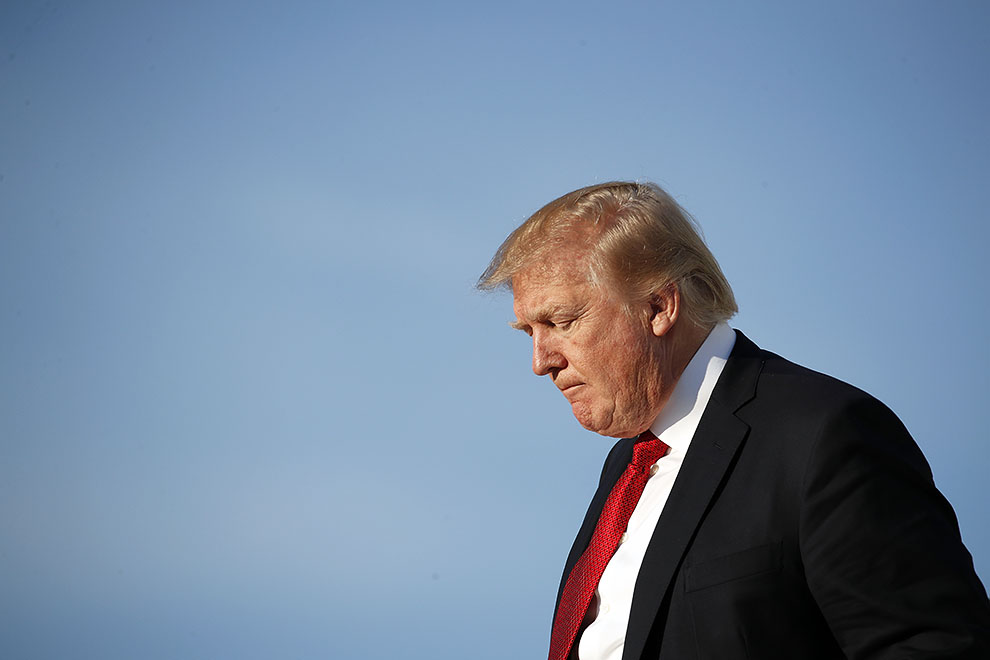Last Thursday’s missile strike against the Shayrat air base by US forces was clearly contrary to law. It didn’t degrade the military capacity of the Assad regime, and the Trump administration has no apparent intention of developing a strategy of engagement. As an isolated and, it seems, ineffective action, the strike was also a poor vehicle for a claimed right of humanitarian intervention.
The United States launched the Tomahawk missile attacks on Shayrat air base in response to the reported use of chemical weapons at Khan Sheikhun, in Syria’s rebel-held Idlib province in northwestern Syria. According to the UN high representative for disarmament affairs, Kim Won-Soo, this was the largest chemical weapons attack in Syria since 2013. At least seventy civilians died, and perhaps 200 were injured. Russia claims that the casualties occurred after Syria bombed a terrorist warehouse containing chemical agents.
Despite widespread condemnation, the UN Security Council has been unable to agree on a response to the Syrian government’s action. The United States, Britain and France sought support for a draft resolution demanding that Syria hand over intelligence on its air operations, including any flight plans produced on the day of the chemical attack, but Russia dismissed the proposal as unnecessary. This failure followed China’s and Russia’s decisions to veto a draft resolution on 28 February that would have imposed sanctions on entities and individuals deemed to be involved in the production or use of chemical weapons in Syria.
President Donald Trump spoke in highly emotional terms after the Khan Sheikhun attack, telling reporters at the White House on 5 April, “That attack on children yesterday had a big impact on me – big impact. That was a horrible, horrible thing. And I’ve been watching it and seeing it, and it doesn’t get any worse than that.” According to his formal advice of the missile strike to congressional leaders on 8 April:
I directed this action in order to degrade the Syrian military’s ability to conduct further chemical weapons attacks and to dissuade the Syrian regime from using or proliferating chemical weapons, thereby promoting the stability of the region and averting a worsening of the region’s current humanitarian catastrophe. I acted in the vital national security and foreign policy interests of the United States. The United States will take additional action, as necessary and appropriate, to further its important national interests.
The US action has generally, if sometimes indirectly, been endorsed by European leaders, by Japanese prime minister Shinzo Abe and by Australian prime minister Malcolm Turnbull. Russia and Iran have taken the contrary view. On 7 April a Kremlin spokesman said that president Vladimir Putin “considers the American strikes against Syria an aggression against a sovereign government in violation of the norms of law, and under a far-fetched pretext.”
Experts generally agree that the US attack was contrary to law. According to John Bellinger, for instance, who was a legal adviser to the State Department under the Bush administration, “As a matter of law, President Trump does not have clear authority to use force in response to Syria’s use of chemical weapons.”
A guidance circulating within the administration justifies the attacks under law in these terms:
The targeted U.S. military action against the Syrian military targets directly connected to the April 4 chemical weapons attack in Idlib was justified and legitimate as a measure to deter and prevent Syria’s illegal and unacceptable use of chemical weapons.
The guidance then lists a number of factors justifying the legality of the missile attacks.
The administration has confused the issue of legality by calling the missile strikes “proportional,” a description adopted by Malcolm Turnbull when he described the attacks as calibrated, proportionate and targeted, at a press conference on 7 April. This confuses law about when a state may use force with how it may use force.
The principle of proportionality in the Law of Armed Conflict states that an attack is unlawful if it may be expected to cause incidental loss of civilian life or injury to civilians that would be excessive in relation to the concrete and direct military advantage anticipated. But Article 2.4 of the UN Charter prohibits the use of force except with Security Council authorisation or as an exercise of the right to individual or collective self-defence. Any use of force beyond these exceptions is illegal, no matter how proportional it may be.
Some law experts have tried to argue that the missile attacks are an exercise of a right to humanitarian intervention, given the Security Council’s inability to act against Syria’s use of chemical weapons. Harold Hongju Koh, the legal adviser to the State Department under president Barack Obama, supported by associate professor Jens David Ohlin of the Cornell Law School, has suggested that the missile attack might meet criteria for humanitarian intervention as an exception to Article 2.4. But even Koh goes no further than describing the right of a humanitarian intervention as an “emerging norm.” And, John Bellinger correctly says, the US government has never recognised a right of humanitarian intervention.
Two considerations cast doubt on whether, even allowing for the existence of a right of humanitarian intervention, the missile attacks can be justified. First, it isn’t clear whether the missile attack has achieved anything in either degrading the capacities of the Assad regime or reversing its ruthless war on its opponents. Administration officials claim that the missile attacks made the Shayrat air base inoperable, but Syrian government aircraft are still using the base, reportedly including for renewed air strikes against Khan Sheikhun.
Second, following its “dizzying turnabout” from Trump’s America First policy, the administration has given no indication that the missile attacks are part of any ongoing activism that would support a principle of humanitarian intervention. Although the administration has suggested that it may act again against any chemical weapons attack, the Washington Post’s David Nakamura reports that it has “struggled to explain how the attack… fits into its broader policy on Syria and the Middle East.” Nakamura quotes an administration official as saying, “We don’t yet know if this is a one-time effort or not. We can’t predict what may or may not happen.”
The missile attacks should be seen, as the New York Times’s Mark Landler has suggested, as “an emotional act by a man suddenly aware that the world’s problems were now his.” They are not an indication of a fundamental policy change by the administration in favour of activism or a viable vehicle for conclusions about the direction of law. •




